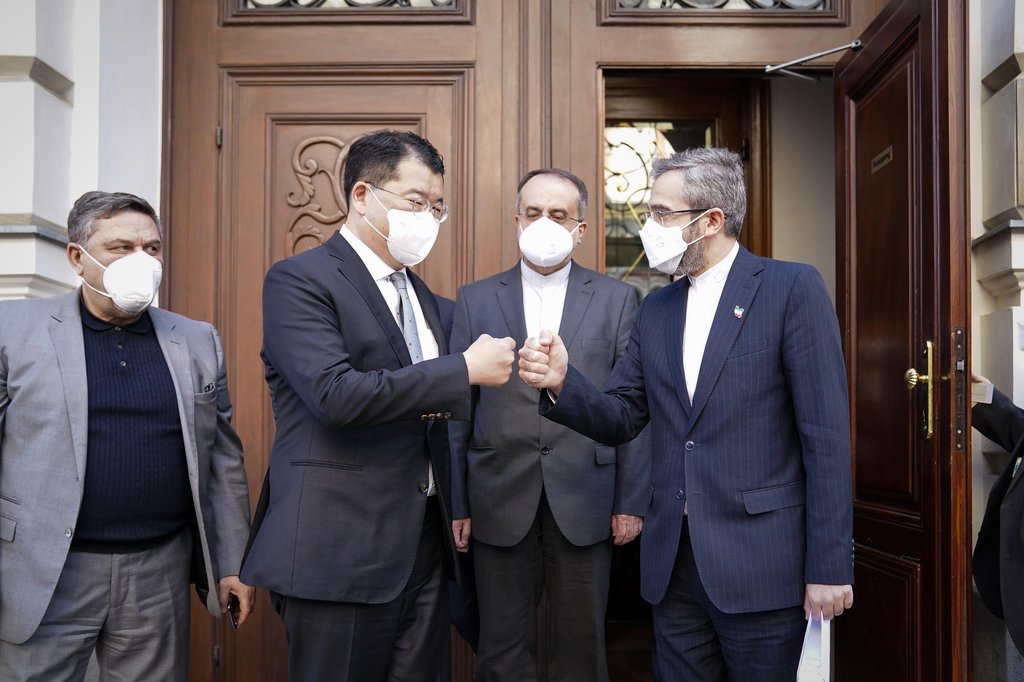Iran’s delegation visited Seoul this week to discuss the prospect for resuming oil and gas condensate exports to South Korea, as well as the possibility of release of Iranian funds that have been frozen in the Asian country.
“The Iranian delegation consisting of banking and oil experts held talks in Seoul this week with South Korean officials and companies in order to look into the possibility of resuming exports of Iranian oil and gas condensate to this country,” Iranian Foreign Ministry Spokesman Saeed Khatibzadeh said at a press conference on February 16.
He added that the results of this expert meeting could be seen as “a touchstone for testing the sincerity and will of South Korea to resolve bilateral issues and restore relations to a normal footing,” including through Iran’s sale of oil and gas condensate to South Korea and South Korean companies investing in Iranian economic projects.
During the talks that started on February 15 and lasted two days, the delegation also discussed the Iranian oil revenues worth over $7 billion and frozen in South Korean banks due to US sanctions against Iran. Tehran insists on releasing these funds, which have proven to be a major point of contention in relations with South Korea.
Meanwhile, the visit to Seoul came as part of the Iranian government-initiated policy of pursuing “balanced relations” with Asian countries.
On January 5, Iran’s chief nuclear negotiator and deputy foreign minister Ali Bagheri Kani met his South Korean counterpart Choi Jong-Kun. The meeting took place during the eighth round of talks in Vienna between Iran and P4+1 (Britain, France, Germany, Russia, and China) aimed to revive the 2015 nuclear deal or the Joint Comprehensive Plan of Action (JCPOA).
As South Korea is not directly involved in the Vienna talks, Choi Jong-Kun arrived in Austria to exchange views with the negotiating parties over the frozen funds belonging to Iran. During the meeting, Bagheri criticized Seoul over its “illegal and unjustifiable refusal to repay its debts” and stressed that Iran’s assets should be released “regardless of the outcome of the Vienna talks.”
Last October, Iran urged the US to release at least $10 billion of frozen Iranian funds if it wants Tehran to resume nuclear talks.
On January 4, in reply to a question about the visit of the South Korean diplomat to Vienna and the possibility of releasing Iran’s assets, US Department of State Spokesperson Ned Price said he “wouldn’t want to get ahead of where we are.” He added that “nothing is agreed until everything is agreed when it comes to these issues.”
In 2021, the United Nations deprived Iran of its voting rights for failing to pay its dues. The US agreed to enable Tehran to use some of the funds held at a South Korean bank to pay a minimum fee for the year and restore its voting power. Iran’s voting right in the UN has been restored since January 24, 2022, after South Korea paid Tehran’s debts of more than $18 million to the organization.







 The Mine Action Agency of Azerbaijan (ANAMA) reported on Thursday the discovery of a significant amount of explosives in the Khojavand district of ...
The Mine Action Agency of Azerbaijan (ANAMA) reported on Thursday the discovery of a significant amount of explosives in the Khojavand district of ...
 Iran’s Foreign Minister, Hossein Amir-Abdollahian, has labeled a foiled Israeli drone attack in certain parts of the country as a "failure" for Isr...
Iran’s Foreign Minister, Hossein Amir-Abdollahian, has labeled a foiled Israeli drone attack in certain parts of the country as a "failure" for Isr...
 Iran has refuted reports of alleged damage to Shimon Peres Negev Nuclear Research Centre located southeast of Dimona, Israel, during the recent air...
Iran has refuted reports of alleged damage to Shimon Peres Negev Nuclear Research Centre located southeast of Dimona, Israel, during the recent air...



